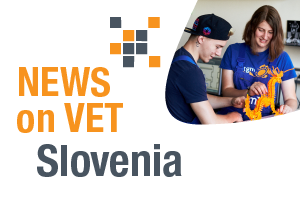Slovenia has been continuously active in the field of digitalisation since the implemented 1993 computer literacy programme, followed by various strategic documents like the Informatisation of education action and the Strategic guidelines for further implementation of ICT. Following the adoption of a Digital education action plan on an EU level, Slovenia adopted a national Digital action plan (ANDI) in April 2022.
Implementation started
The implementation of ANDI began with the 2023 e-bag project (eTorba). The Ministry of Education, the Academic and Research Network of Slovenia (ARNES) and the Institute of Information Science (IZUM) are running this project to support the introduction of new approaches in education. The project aims to create a national platform for electronic textbooks and various learning resources, the eTorba platform. The goal is to ensure that students can access all necessary materials for successful learning through this platform, without necessarily needing printed books. More specifically, the platform will include an e-reader, which enables better activity and interaction among students by allowing functions like underlining, highlighting, and adding notes while using electronic learning materials.
Additionally, the 2023-26 Digital and sustainable teacher (Digitrajni učitelj) project targets over half of Slovenia's teachers, intending to improve their digital competences, basic knowledge of computer science, financial literacy, and sustainability competences. The project incorporates extensive use of self-reflection tools such as Selfie, Selfie for Teachers, and EU digital frameworks such as GreenComp, and integrates modules like Informatics for All, as well as good practices from other EU countries.
The implementation of ANDI also includes the ongoing 2022-26 curriculum reform process for general subjects and VET. One of its goals is the horizontal introduction of digital competences for students.
Projects focused on primary and secondary education
International and domestic documents analysing the situation in Europe and Slovenia show a need for systemic integration and upgrading of the way computer and information science is taught. Slovenia’s timely reaction aims at equipping its citizens as early as pre-nursery school, preparing them for a successful integration in the digital and green society.
August 2023 saw starting projects focused on equipping the existing generations of students with digital competences, basic knowledge of computer science and computational thinking.
The B-RIN project is focused on developing an experimental framework (e.g. didactic strategies and teaching approaches) for the introduction, implementation and evaluation of the core content of computing and informatics (računalništvo in informatika - RIN, in Slovenian) in kindergartens and primary schools. Particular focus is on adapting the didactic strategies for teaching the basics of computer science to individual learner needs.
Finally, the Innovative pedagogy 5.0 project aims to develop innovative learning scenarios and prepare concrete examples and teaching approaches to be tested in 40 selected schools (480 innovative classes). It is also intended for development and assessment of students’ basic skills in computing and informatics.
Implementation and assessment of these pilot projects are expected to provide information about good practices and challenges encountered.
Read more
- Pripravlja se nova etorba: projekt eTorba 2023 [A new E-bag is being prepared: the eTorba 2023 project]
- Portal eTorba [eTorba platform]
- Akcijski načrt za digitalno izobraževanje (ANDI) 2021-2027 [The national Digital Education action plan (ANDI) 2021 – 2027] (only in Slovenian)
- Računalništvo in informatika za vse [Computer and Information science for all]
- Inovativna pedagogika 5.0 [Innovative pedagogy 5.0]
|
Please cite this news item as: ReferNet Slovenia; Cedefop (2023). Recently implemented action plan ANDI to transform digital education. National news on VET |
